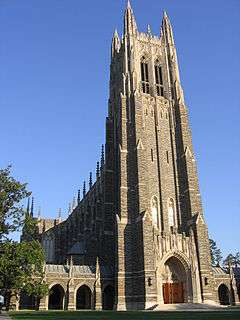Duke University School of Law
Duke University School of Law (also known as Duke Law School or Duke Law) is the law school and a constituent academic unit of Duke University, Durham, North Carolina, United States. One of Duke's 10 schools and colleges, the School of Law began as the Trinity College School of Law in 1868. In 1924, following the renaming of Trinity College to Duke University, the school was renamed the Duke University School of Law.
| Duke University School of Law | |
|---|---|
| Parent school | Duke University |
| Established | 1868 |
| School type | Private |
| Parent endowment | $8.5 billion |
| Dean | Kerry Abrams |
| Location | Durham, North Carolina, U.S. |
| Enrollment | 715 |
| USNWR ranking | 12th |
| Website | www |
Duke Law is consistently ranked as one of the top law schools in the United States and admits roughly 20 percent of applicants.[1] The law school is one of the "T14" law schools, that is, schools that have consistently ranked within the top 14 law schools since U.S. News & World Report began publishing rankings.[2] According to Law.com, 91.36% of graduating students were employed within ten months,[3] with a median starting salary in the private sector of $190,000.[4]
Duke's 2020 class bar passage rate was 98 percent, which was the second highest bar passage rate in the country after Harvard Law School.[5] As of 2019, the Law School Transparency estimated debt-financed cost of attendance for three years is $329,609.[6]
Reputation
Duke Law is routinely ranked within the top 14 law schools in the country, and is a member of the "T-14" law schools. It has never been ranked lower than 12th by U.S. News, or less than 7th by Above the Law.[7] Duke Law is one of three T14 law schools to have graduated a President of the United States (Richard Nixon). Duke Law was ranked by Forbes as having graduated lawyers with the 2nd highest median mid-career salary amount.[8][9] It is tied as the #8 best law school by the 2015 U.S. News overall law school Rankings.[10] In 2017, The Times Higher Education World University Rankings listed Duke Law as the number one ranked law school in the world.[11]
Admissions
The law school is one of few that have experienced an increase in law school applications despite an overall national decline of applications in recent years. For the class entering in the fall of 2014, 221 students enrolled out of 5,358 applicants. The 25th and 75th LSAT percentiles for the 2014 entering class were 166 and 170, respectively, with a median of 169 (top three percent of test takers worldwide). The 25th and 75th undergraduate GPA percentiles were 3.66 and 3.85, respectively, with a median of 3.77.[12] The school has approximately 640 JD students and 75 students in the LLM and SJD programs.
History
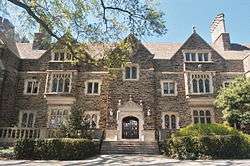
The date of founding is generally considered to be 1868 or 1924.
However, in 1855 Trinity College, the precursor to Duke University, began offering lectures on (but not degrees in) Constitutional and International Law (during this time, Trinity was located in Randolph County, North Carolina).
In 1865, Trinity's Law Department was officially founded, while 1868 marked the official chartering of the School of Law. After a ten-year hiatus from 1894 to 1904, James B. Duke and Benjamin Newton Duke provided the endowment to reopen the school, with Samuel Fox Mordecai as its senior professor (by this time, Trinity College had relocated to Durham, North Carolina). When Trinity College became part of the newly created Duke University upon the establishment of the Duke Endowment in 1924, the School of Law continued as the Duke University School of Law. In 1930, the law school moved from the Carr Building on Duke's East Campus to a new location on the main quad of West Campus. During the three years preceding this move, the size of the law library tripled. Among other well-known alumni, President Richard Nixon graduated from the school in 1937. In 1963, the school moved to its present location on Science Drive in West Campus.
Law students at Duke University established the first U.S. Chapter of the International Criminal Court Student Network (ICCSN) in 2009.[13]
Rankings
- 1st Best Law School in the world, Times Higher Education (2018)[14]
- 1st Best Professors according to the Princeton Review (2015 and 2016; 2nd in 2018-2020)[15]
- 1st Best Quality of Life according to the Princeton Review (2014, 2nd in 2015 and 2017)[15]
- 2nd Best Law School by Above the Law (2019)[16]
- 2nd Highest Median Mid-Career Salary[9]
- 2nd Best Classroom Experience according to Princeton Review (2015 and 2017, 3rd in 2018 and 2019, 4th in 2020)[15]
- 3rd Best Career Prospects according to Princeton Review (2020)[15]
- 3rd Best Law School (overall) according to the Best Law Schools ranking published by the National Jurist in 2013.
- 5th Best Law School by Vault (2017)[17]
- 5th Best Law School by Business Insider[18]
- 5th Toughest to get into according to the Princeton Review[15]
- 5th Best Law School for BigLaw Hiring according to National Law Journal's "Go-To Law Schools" ranking[19]
- 6th Best Law School according to CNN Money[20]
- 6th Best Law School for Federal Clerkships according to National Jurist[21]
- 6th Best Law School for Moot Court according to National Jurist[22]
- 8th Best Law School as Ranked by Law Firm Recruiters[23]*
- 10th Best in the world in the subject of law according to the Academic Ranking of World Universities in 2017[24]
- 10th Best for Standard of Living according to National Jurist[25]
- Tied for 10th Best Law School by U.S. News Rankings[10][26]
- 12th Most Median Grant Money and Percentage of Students Receiving Grants according to National Jurist[21]
- 17th Best Law Review according to National Jurist[27]
- 19th Best Law School Library according to National Jurist[28]
Facilities
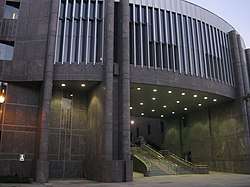
The Trinity College School of Law was located in the Carr Building prior to the renaming of Trinity to Duke University in 1924. The Duke University Law School was originally housed in what is now the Languages Building, built in 1929 on Duke's West Campus quad.
The law school is presently located at the corner of Science Drive and Towerview Road and was constructed in the mid-1960s.
The first addition to the law school was completed in 1994, and a dark polished granite façade was added to the rear exterior of the building, enclosing the interior courtyard.
In 2004, Duke Law School broke ground on a building construction project officially completed in fall 2008. The renovation and addition offers larger and more technologically advanced classrooms, expanded community areas and eating facilities, known as the Star Commons, improved library facilities, and more study options for students.
Center for the Study of the Public Domain
Center for the Study of the Public Domain is an university center, aiming to redress the balance of academic study of intellectual property. In their analysis, academic focus has been too great on the incentives created by these rights, rather than the contribution to creativity from information which is not subject to them and also opposing the fair use,[29] as they're focusing on Copyright Act of 1909 rather than Copyright Act of 1976[30]
Law journals
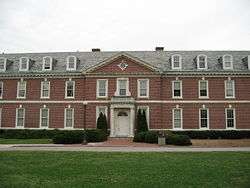
Duke Law School publishes eight academic journals or law reviews, which are, in order of their founding:
- Law and Contemporary Problems
- Duke Law Journal
- Alaska Law Review
- Duke Journal of Comparative & International Law
- Duke Environmental Law & Policy Forum
- Duke Journal of Gender Law & Policy
- Duke Law & Technology Review
- Duke Journal of Constitutional Law & Public Policy
Law and Contemporary Problems is a quarterly, interdisciplinary, faculty-edited publication of the law school. Unlike traditional law reviews, L&CP uses a symposium format, generally publishing one symposium per issue on a topic of contemporary concern. L&CP hosts an annual conference at the law school featuring the authors of one of the year’s four symposia.[31] Established in 1933, it is the oldest journal published at the law school.
The Duke Law Journal was the first student-edited publication at Duke Law and publishes articles from leading scholars on topics of general legal interest.
Duke publishes the Alaska Law Review in a special agreement with the Alaska Bar Association, as the state of Alaska has no law school.
The Duke Journal of Gender Law & Policy (DJGLP) is the preeminent journal for its subject matter in the world.
The Duke Law & Technology Review has been published since 2001 and is devoted to examining the evolving intersection of law and technology.
The Duke Journal of Constitutional Law & Public Policy was founded by members of the Class of 2006. Professors Erwin Chemerinsky and Christopher H. Schroeder served as the ConLaw journal's inaugural faculty advisors. Mikkelsen was the first editor-in-chief; the current editor-in-chief is Daniel Browning.[32] The journal intends to fill a gap in law journal scholarship with a publication that could "cover constitutional developments and litigation, and their intersection with public policy". To ensure that the journal would remain timely, it established a partnership with the Duke Program in Public Law to produce "Supreme Court Commentaries" summarizing and explaining the impact recent cases could have on current issues. The journal publishes continually online and annually in print. It has sponsored speaker series and conferences exploring various issues in constitutional law and public policy.
The law school provides free online access to all of its academic journals, including the complete text of each journal issue dating back to January 1996 in a fully searchable HTML format and in Adobe Acrobat format (PDF). New issues are posted on the web simultaneously with print publication.
In 2005, the law school was featured in the June 6 unveiling of the Open Access Law Program, an initiative of Creative Commons, for its work in pioneering open access to legal scholarship.
Joint-degree programs
The School offers joint-degree programs with the Duke University Graduate School, the Duke Divinity School, Fuqua School of Business, the Medical School, the Nicholas School of the Environment and Earth Sciences, the Pratt School of Engineering, and the Sanford School of Public Policy; and a JD/LLM dual degree program in International and Comparative Law. Approximately 25 percent of students are enrolled in joint-degree programs.
Employment
According to Duke's 2017 ABA-required disclosures, 93.8 percent of the class of 2017 obtained full-time, long-term, JD-required employment nine months after graduation and not funded by the school – the highest number for any law school in the country.[33] According to the NLJ, Duke ranks third among all law schools in the percentage of 2017 graduates working in federal clerkships or jobs at firms of 100 or more lawyers, a category NLJ terms "elite jobs". Duke also ranks fourth in federal clerkships.[33]
Law School Transparency gave Duke Law the highest "Employment Score" in the country at 93.8 percent and lowest "Under-Employment Score" of 0.4 percent in 2017.[34]
Costs
The total cost of attendance (indicating the cost of tuition, fees, and living expenses) at Duke for the 2015–2016 academic year is $80,937.[35] The Law School Transparency estimated debt-financed cost of attendance for three years is $329,609.[36]
Notable faculty
Current faculty
Notable faculty including a sitting Supreme Court Justice, a former United States Senator, 14 former Supreme Court clerks, a former federal judge and a former Judge Advocate General.
- Samuel Alito, Associate Justice of the Supreme Court of the United States
- James Boyle, William Neal Reynolds Professor of Law (Intellectual Property and Legal Theory)
- James Earl Coleman, John S. Bradway Professor of Law (criminal law) and Director of the Center for Criminal Justice and Professional Responsibility
- Richard A. Danner, Archibald C. and Frances Fulk Rufty Research Professor of Law (former law librarian at University of Wisconsin–Madison)
- Walter E. Dellinger III, Douglas Blount Maggs Professor of Law, Fmr. Acting Solicitor General of the United States (1996–1997), Fmr. Law Clerk to Supreme Court Justice Hugo Black
- James C. Dever III, United States District Judge of the United States District Court for the Eastern District of North Carolina
- Charles J. Dunlap Jr., Professor of the Practice of Law, Executive Director, Duke Center on Law, Ethics and National Security, Major General of the United States Air Force
- Thavolia Glymph, John Hope Franklin Visiting Professor of American Legal History
- Jack Knight, Frederic Cleaveland Professor of Law and Political Science
- David F. Levi, Dean, former Chief Judge of the United States District Court for the Eastern District of California (1994–2007), Fmr. Law Clerk to Supreme Court Justice Lewis Powell.
- H. Jefferson Powell, Professor of Law, Fmr. Principal Deputy Solicitor General of the United States
- Jedediah Purdy, Robinson O. Everett Professor of Law
- Arti K. Rai, Elvin R. Latty Professor of Law, Fmr. Administrator of the Office of External Affairs at the U.S. Patent and Trademark Office (2009-2010)
- Sarah Bloom Raskin, Rubenstein Fellow, Fmr. United States Deputy Secretary of the Treasury (2014-2017), Fmr. Governor of the Federal Reserve (2010-2014)
- Christopher H. Schroeder, Charles S. Murphy Professor of Law (administrative law), Assistant Attorney General for the Office of Legal Policy (OLP), Fmr. Acting Assistant Attorney General for the Office of Legal Policy, Chief Counsel to the U.S. Senate Judiciary Committee
- Scott Silliman, Professor of the Practice of Law (national security law, military law, and the law of armed conflict)
- Michael Tigar, Professor of the Practice of Law (criminal law), Fmr. Law Clerk to Supreme Court Justice William Brennan,
- Jonathan B. Wiener, William R. and Thomas L. Perkins Professor of Law (Risk Analysis and Regulation)
Former faculty
- William Van Alstyne, former William R. & Thomas S. Perkins Chair of Law (Constitutional Law), 1974–2004 (deceased)
- Erwin Chemerinsky, former Alston & Bird Professor of Law (Constitutional Law), current Dean of the UC Berkeley School of Law
- Brainerd Currie, conflict of laws pioneer (deceased)
- Robinson O. Everett, Professor of Criminal Law and Former Chief Judge of the United States Court of Military Appeals (deceased) (also professor at Wake Forest University)
- Joseph Tyree Sneed, III, former Dean (1971-1973); federal judge (1973-1987) (deceased)
Notable alumni
Political
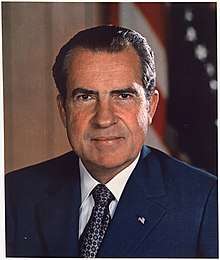
- Willis Smith, 1912 – U.S. Senator from North Carolina
- William B. Umstead, '21 – former Governor of North Carolina, U.S. Senator from North Carolina, U.S. Representative from North Carolina, Chairman of the North Carolina Democratic Party
- Richard Nixon, '37 – 37th President of the United States
- Nick Galifianakis, '53 – U.S. Representative from North Carolina
- Jim Courter '66 – former U.S. Representative from New Jersey[37]
- Daniel T. Blue, Jr. '73 – North Carolina State Senator and former Speaker of the North Carolina House of Representatives
- Kenneth Starr, '73 – United States Solicitor General, Independent Counsel during the Clinton Administration
- Bill Campbell, '77 – former Mayor of Atlanta, Georgia
- Jaime Aleman Healy, '79 – Panama's Ambassador to the United States
- Denise Majette, '79 – U.S. Representative from Georgia
- David Addington, '81 – Chief of Staff and former legal counsel to Vice President Dick Cheney
- Michael Dreeben, '81 – Deputy Solicitor General of the United States, and a member of the legal teams involved in the Special Counsel investigation (2017–present) led by Robert Mueller
- Tom Grady, '82 – U.S. Representative from Florida
- Floyd McKissick Jr., '84 - North Carolina State Senator
- Manuel Sager, '85 – Swiss Ambassador to the United States
- Dave Trott, '85 – U.S. Representative from Michigan and fundraiser for the Republican National Committee
- Susan Bysiewicz, '86 – Lieutenant Governor of Connecticut, Former Connecticut Secretary of State
- David McKean,[38] '86 – U.S. Ambassador to Luxembourg, former Director of Policy Planning
- Mike Turzai, '87 – Speaker of the House, Pennsylvania House of Representatives
- Claude Allen, '90 – former Assistant to the President for Domestic Policy
- John Jay Hoffman, '92 – Attorney General of New Jersey
- Michael Elston, '94 – former Chief of Staff & Counselor, Office of the Deputy Attorney General
- Darren Jackson, '96 - House Minority Leader, North Carolina House of Representatives
- Jerry Meek, '97 – former Chairman of the North Carolina Democratic Party
- Mike Levin, '05 - U.S. Representative from California
- Marc Elias '93 - Partner at Perkins Coie LLP, General Counsel for Hillary Clinton's 2016 presidential campaign and for John Kerry's 2004 presidential campaign
Judiciary
- Charles Becton, '69 – former Judge, North Carolina Court of Appeals
- Garrett Brown, Jr., '68 – former Chief Judge, U.S. District Court for the District of New Jersey
- J. Michelle Childs, 'LLM '16, U.S. District Judge, U.S. District Court for the District of South Carolina
- Robert L. Clifford, '50 – former Associate Justice, Supreme Court of New Jersey
- Curtis Lynn Collier, '74 – senior U.S. District Judge, U.S. District Court for the Eastern District of Tennessee
- Colm Connolly, '91 – U.S. District Judge, U.S. District Court for the District of Delaware
- Timothy J. Corrigan, '81 – U.S. District Judge, U.S. District Court for the Middle District of Florida
- Mark A. Davis, 'LLM '18 – Associate Justice, North Carolina Supreme Court
- James C. Dever III, '87 – U.S. District Judge, U.S. District Court for the Eastern District of North Carolina
- Allyson Kay Duncan, '75 – retired U.S. Circuit Judge, U.S. Court of Appeals for the Fourth Circuit
- Christine Durham, '71 – first female Justice of the Utah Supreme Court
- Richard Gergel, '79 – U.S. District Judge, U.S. District Court for the District of South Carolina
- David Gustafson, '81 – Judge, United States Tax Court
- Eva Guzman, LLM'14 – Texas Supreme Court Justice
- Todd M. Hughes, '92 – U.S. Circuit Judge, U.S. Court of Appeals for the Federal Circuit; first openly gay U.S. Circuit Court Judge
- Carolyn Kuhl, '77 – Judge, Los Angeles Superior Court
- Denise Majette, '79 – former U.S. Representative from Georgia, former Georgia state judge
- Mandisa Maya, '90 – President of the Supreme Court of Appeal of South Africa
- Graham Calder Mullen, '69 – senior U.S. District Judge, U.S. District Court for the Western District of North Carolina
- William H. Pauley III, '77 – senior U.S. District Judge, U.S. District Court for the Southern District of New York
- Jeremy B. Rosen, '97 - nominee, U.S. District Judge, U.S. District Court for the Central District of California
- Robin L. Rosenberg, '89 - U.S. District Judge, U.S. District Court for the Southern District of Florida
- Allison Jones Rushing, '07 – U.S. Circuit Judge, U.S. Court of Appeals for the Fourth Circuit
- Kenneth Starr, '73 – former U.S. Circuit Judge, U.S. Court of Appeals for the District of Columbia
- Gary S. Stein, '56 – former Associate Justice, Supreme Court of New Jersey
- Donna Stroud, 'LLM '14 – Judge, North Carolina Court of Appeals
- A. William Sweeney, '48 – former Justice, Supreme Court of Ohio
- Patricia Timmons-Goodson, 'LLM '14 – former Associate Justice, North Carolina Supreme Court
- Michael B. Thornton, '82 – Judge, United States Tax Court
- Gerald B. Tjoflat, '57 – U.S. Circuit Judge, U.S. Court of Appeals for the Eleventh Circuit
- Ernest C. Torres, '68 – retired U.S. District Judge, U.S. District Court for the District of Rhode Island
- Peter Verniero, '84 – former Associate Justice, Supreme Court of New Jersey & Former New Jersey Attorney General
- Sarah Hawkins Warren, '08 - Associate Justice, Georgia Supreme Court & Former Georgia Solicitor General
- Charles K. Wiggins, '76 – Associate Justice, Washington Supreme Court
- Don Willett, '92 – U.S. Circuit Judge, U.S. Court of Appeals for the Fifth Circuit & Former Texas Supreme Court Justice; famous, in part, for his social media commentary
- Mary Ellen Coster Williams, '77 – Senior Judge, U.S. Court of Federal Claims
.jpg)
Academia
- Garrett Epps, '91 – Professor, University of Baltimore School of Law
- Pamela Gann, '73 – President, Claremont McKenna College (former Duke Law professor)
- Ben F. Johnson, '49 - Dean, Emory University School of Law and Georgia State University College of Law
- Ivan C. Rutledge – Dean, Ohio State University Moritz College of Law.
- Rodney A. Smolla, '78 – President, Furman University in South Carolina
- Michael Sorrell, '94 – President, Paul Quinn College in Texas
- Kenneth Starr, '73 – Former President of Baylor University and former Dean of Pepperdine University School of Law
- Zephyr Teachout, '99 – Professor, Fordham University School of Law
Business
- John Canning, Jr., '69 – Co-founder of Madison Dearborn Partners, Co-owner of Milwaukee Brewers
- Gérard Louis-Dreyfus, '57 – Billionaire/Energy Magnate, Chairman of Louis Dreyfus Energy Services. Father of actress Julia Louis-Dreyfus
- Happy R. Perkins, '80 – former Vice President and General Counsel, GE Energy
- Monty Sarhan, '99 – Publisher and CEO, Cracked Magazine
- Gao Xiqing, '86 – Vice Chairman, President, and Chief Investment Officer of the China Investment Corporation
Military
- Dan McCarthy, '83 – JAG Chief Prosecutor, United States Navy
Sports
- Drew Rosenhaus, '90 – Sports Agent/Owner of Rosenhause Sports
- Jay Bilas, '92 – ESPN Commentator and Former Duke Basketball Player and Coach
- Quin Snyder, '95 – Head Coach, Utah Jazz

Miscellaneous
- John H. Adams, '62 – Founding Director, Natural Resources Defense Council
- D. Todd Christofferson, '72 – Apostle, The Church of Jesus Christ of Latter-day Saints
- Ben Fountain, '83 – Novelist, Billy Lynn's Long Halftime Walk
- Matt Jones, '03 – radio host
- Jeffrey Lichtman, '90 – Prominent criminal defense attorney
- Arlinda Locklear, '76 – lawyer, the first Native American woman to argue a case before the U.S. Supreme Court
- Keith Lucas, attended – writer and producer of Judas and the Black Messiah, creator of Lucas Bros. Moving Co., stand-up comedian
- Bascom Lamar Lunsford, 1913 – Folk musician
- Gary Lynch, '75 – Chief Legal Officer, Morgan Stanley
- David H. Steinberg, '93 – Writer/Director for film and television
- Tucker Max, '01 – Humorist and entrepreneur (associated with "fratire")
- Charlie Rose, '68 – journalist/TV host of the Charlie Rose Show on PBS
- Michael P. Scharf, '88 – professor of law and director of the Frederick K. Cox International Law Center at Case Western Reserve University School of Law
- Teddy Schwarzman, '06 – Academy Award-nominated film producer, The Imitation Game (son of Stephen A. Schwarzman)
Fictional
- Lt. Colonel Sarah MacKenzie, USMC, portrayed by Catherine Bell on JAG, earned her law degree from Duke University School of Law.
- Sam Seaborn, portrayed by Rob Lowe on The West Wing, graduated from Duke Law School.
Deans of Duke Law School
- 1850 – 1882, Braxton Craven[39]
- 1891 – 1894, A.C. Avery
- 1904 – 1927, Samuel Fox Mordecai
- 1927 – 1930, W. Bryan Bolich (acting)
- 1930 – 1934, Justin Miller
- 1934 – 1947, H. Claude Horack
- 1947 – 1949, Harold Sheperd
- 1949 – 1950, Charles L.B. Lowndes
- 1950 – 1956, Joseph A. McClain, Jr.
- 1956 – 1957, Dale F. Stansbury (acting)
- 1957 – 1966, Elvin Latty
- 1966 – 1968, F. Hodge O'Neal
- 1968 – 1970, A. Kenneth Pye
- 1971 – 1973, Joseph Tyree Sneed III
- 1973 – 1976, A. Kenneth Pye
- 1976 – 1977, Walter Dellinger (acting)
- 1978 – 1988, Paul Carrington
- 1988 – 1999, Pamela Gann
- 1999 Clark C. Havighurst (interim)
- 2000 – 2007, Katherine T. Barlett
- 2007 – 2018, David F. Levi
- 2018 – present, Kerry Abrams
References
- "Duke Law School | Law School Numbers". duke.lawschoolnumbers.com. Retrieved April 19, 2016.
- "Prelaw Handbook Historical US News Rankings". PRELAWHANDBOOK. Retrieved January 14, 2012.
- May 08, Karen Sloan |; PM, 2019 at 01:26. "Law Grads Hiring Report: Job Stats for the Class of 2018". Law.com. Retrieved May 26, 2019.
- "Bar Passage Rates".
- "Duke University". www.lstreports.com. Retrieved May 26, 2019.
- http://abovethelaw.com/2011/03/more-law-school-rankings-best-law-schools-for-getting-rich/
- "Best Law Schools in the World". Times Higher Education. Retrieved October 5, 2017.
- "International Criminal Court Student Network takes hold at Duke". Duke Law News. Duke University. January 1, 2009. Retrieved June 1, 2017.
- Times Higher Education
- Princeton Review
- Above the Law
- Vault
- Archived March 14, 2012, at the Wayback Machine preLaw by National Jurist Winter 2012
- ARWU 2017 - Law Subject ranking
- National Jurist September 2011
- "US News Best Law School Duke University".
- preLaw by National Jurist Spring 2010
- "About page, Center website". Law.duke.edu. Retrieved January 1, 2013.
- "Public Domain Day 2018 Pre-1976, Center website". Law.duke.edu. Retrieved October 12, 2019.
- "About Us – Law and Contemporary Problems". Duke University School of Law.
- https://djclpp.law.duke.edu/masthead/
- "Employment Statistics".
- http://www.lstscorereports.com/national/
- "Tuition and Expenses".
- "Duke University Profile".
- James Andrew Courter, Biographical Directory of the United States Congress. Accessed September 6, 2007.
- David McKean state department profile
- Official list of Deans
